Buttons (August 12, 2007 by
James Montgomery Jackson)
At the beginning of May I
made one last patrol through our place in Kentucky looking for anything I may
have forgotten to pack to take back north for the eight to nine months we
planned to be here. I have a checklist to ensure I don’t leave behind anything
irreplaceable, but I’m not prescient at anticipating other needs. We have only
been back for a bit over three months and already I know my guesses were not
perfect. We have several caulk guns sitting on a shelf in the Kentucky garage
and now have a set in Michigan. Several times I have wanted a reference book and
it is in the wrong state’s library. This happens when I am in Kentucky as well.
So, I was on my last ramble,
opening drawers and closets, trying to anticipate the future and I ran across a
small collection of buttons. “Hmm,” I said to myself, “this may be the basis for
a sermon.” Jan agreed and so here we are today with my collection of saved
buttons.
When I was growing up, back
when garages were used for cars, not as storage and back before the ubiquitous
self-storage sites mushroomed from the earth’s crust, my mother instituted a
policy before Christmas each year of going through our toys and games and
pitching out the unused to make room for what Santa would bring. That policy
cost me my Davy Crockett Coonskin hat and other treasures that if saved and if
(and this is a HUGH if) they had been in good shape I could now be an e-Bay
millionaire. However, I used my stuff hard and it was mostly junk when it hit
the trash can.
Now I come from New England
stock – you know, the ones who build barn extensions to the extensions their
parents built to the extensions their parents built. Well you get the picture.
So there has always been a struggle between my New England genes, which strongly
recognize the survival strategy of keeping everything because you just never
know, and my mother’s lessons. The older I have gotten, the more my mother’s
lessons have won. I periodically go through “cleaning out” phases and years of
“treasures” hit the trash can.
Over the years I have had
perhaps a hundred or more buttons and yet the collection now consists of less
than ten. Those I keep still have meaning or lessons for me. So here are a few,
starting with the most recent.
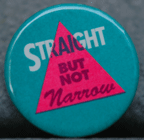 In
the 1990s while I lived in Cincinnati there was a push to change the city
charter to prohibit legislation to protect against discrimination based on
sexual orientation. The proponents of this change coded their message by using
the advertising slogan “Equal Rights, not Special Rights.” Using specious,
inflammatory arguments and massive advertising funded by outside interests they
won and for 13 years Cincinnati had to exclude any reference to sexual
orientation from its anti-discrimination laws.
In
the 1990s while I lived in Cincinnati there was a push to change the city
charter to prohibit legislation to protect against discrimination based on
sexual orientation. The proponents of this change coded their message by using
the advertising slogan “Equal Rights, not Special Rights.” Using specious,
inflammatory arguments and massive advertising funded by outside interests they
won and for 13 years Cincinnati had to exclude any reference to sexual
orientation from its anti-discrimination laws.
I was proud to wear my
“Straight But Not Narrow” button. I keep it to remind me to stand up whenever
anyone’s rights are at stake, not just my own. Although many versions of his
poem have been published, as near as I can tell Pastor Martin Niemöller wrote it
this way:
When
the Nazis came for the communists,
I remained silent;
I was not a communist.
When they locked up the social democrats,
I remained silent;
I was not a social democrat.
When they came for the trade unionists,
I did not speak out;
I was not a trade unionist.
When they came for me,
there was no one left to speak out.
It grieves me that we must
have clauses under the category of “Thou shall not discriminate,” but today it
seems necessary. Being born a white male to middle class parents in a rich
country I know little of discrimination on a personal level. As I grow older and
infirm I will likely get a taste, unless this country changes materially in the
next few years. No matter, as long as there is discrimination against any subset
of us, it is discrimination against all of us and I will find it appropriate to
wear a button similar to the “Straight but not narrow.”
When the Cincinnati charter
amendment was finally overturned I was no longer a resident and so could not
vote in that change. But here is what happened: Leadership for the change came
from big business, the same big businesses who throughout the nineties
implemented corporate policies against sexual orientation discrimination.
It illustrates a lesson I
learned only after a long period of tilting at windmills. Working within the
power structure can succeed; outside of it rarely does. Keep that thought on
hold for now; we’ll pick it up with a button from an earlier time.
I, and I suspect many of you,
are drawn to those things that reinforce our beliefs. I received this next
button, Life is Contingencies, as part of an advertising campaign for a
then new bi-monthly magazine, Contingencies, published by the American
Academy of Actuaries of which I was a member. I keep this button because it
reaffirms my beliefs on so many levels.
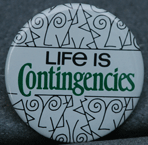
Life is a series of events
that were not anticipated or likely to occur, but did. People find some
congruence of events, for example that we have a common acquaintance from our
distant pasts, and ask “what are the chances of that?” The answer, of course, is
100% for it happened. But what they mean is who would have thunk it?
Life is dependent upon
chance. I would probably never have become an actuary if I hadn’t volunteered in
migrant day camps and Head Start programs and then answered an ad for a lab
technician. Who would have thunk it?
During my delivery into this
world I rolled over, entangling myself and taking an extra hour an a half or so
to be born. My mother was not pleased with this turn of events which caused me
to be born 1:00 am on October 27. Nineteen years later, having already
surrendered my 2S deferment because of its unfairness to the poor, I held my
breath awaiting the results of the first draft lottery, which occurred in
December 1969. October 27th drew number 262 meaning my chances of
being drafted were nil. Had I been born an hour earlier on October 26, my
lottery number would have been number 7.
Much of our individual lives
is framed by the chance encounters and events that are thrust upon us. We
Unitarian Universalists have eliminated original or individually perpetrated sin
as the cause of misfortune. Yet many in the US still hold onto the myth that the
measure of our virtue is the size of our wealth. I reject that our individual
success is God’s favor upon us for being among his chosen people as vehemently
as I reject that destroying the World Trade Center on 9/11/2001 was God’s
punishment for our sinful ways.
At one level, life is a
series of chances, contingencies that taken as a whole define us. At another
level, life is a contingency, a possibility for which we must prepare. That is
considerably different from God rewarding or punishing us for being American. It
is pure chance that I was born in the richest country in the world as it neared
its zenith of power.
It is one of those scary,
grown-up realizations that our life as we have lived it was a choice. I am not
suggesting we all start on a level playing field. We do not. Those with money
have advantages. Males have advantages. Whites have advantages. Those with good
health have advantages. I refuse to feel guilty about any of those advantages,
given that I had no control over the initial throw of the dice. The question
becomes what do I do now?
Regardless of the advantages
we started with, if we choose to drift with the tides we will be crushed upon
rocky shores, or shunted to some backwater tide pool. Yet if we prepare for
life, we can live it. We must embrace life’s contingencies and seize the moments
we have in this great mystery of life.
I received this third button
in the mail as part of a 1970s era promotion for a new line of Clairol hair
products. I was immediately struck by its message: Try a little KINDNESS.
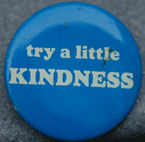 I
threw away the sample and promptly pinned the button on my jacket and wore it
there for several years. At its deepest level this concept resonates with my
sense of what is right in human relations. Think about how your relationship
with every other human will change if your first thought is to try a little
kindness.
I
threw away the sample and promptly pinned the button on my jacket and wore it
there for several years. At its deepest level this concept resonates with my
sense of what is right in human relations. Think about how your relationship
with every other human will change if your first thought is to try a little
kindness.
Mark Twain said that
“kindness is a language the deaf can hear and the blind can see.” I am convinced
that if we all tried a little kindness in everything we do we would not have to
spend much time working for peace; we would be living in peace. Albert
Schweitzer said “Constant kindness can accomplish much. As the sun makes ice
melt, kindness causes misunderstanding, mistrust and hostility to evaporate.”
Since today seems to be my
day for public confession of some of my many failings, I have to admit that my
inner knowledge and outer practice of kindness are not at the same levels. I
know from past experience that each and every act of kindness I perpetrate
leaves me changed for the better, but in my rush to live MY life, I sometimes
forget the positive rewards I receive from my kindness to others and focus only
on my current trivial objective at the moment.
Retirement has helped me
achieve a better balance between knowing how to act and acting, at least in some
trivial matters. I have always been good at merges: letting one car in to the
line in front of me. From time-to-time nowadays, I find myself, when the lines
are unequal, letting a couple of vehicles in – much to the cursing frustration
of my former selves in the line behind me who think that if they are 2.4 seconds
later for a meeting the world might end.
I’ve learned to better follow
parental advice to “say something nice or say nothing at all.” Most of you
labeled yourselves as “Amiables” when we talked last year about Social Styles.
You probably took those words about saying something nice to heart from the very
start. For me, the “Analytical Driver,” you can translate my conversion to mean
I remember more often to keep my mouth shut.
And yet this idea of kindness
is richer than common politeness and courtesy, not that they are unimportant. By
focusing on kindness we have a framework for developing right relations in each
of our human interactions. We will still have conflict because we will always
have competing goals, but if we infuse our relationships with kindness we may
find much of our angst over conflict disappears as ephemeral clouds dispersed by
the strong winds of kindness. In practicing kindness we find solutions that meet
more objectives; we find some of our original objectives are no longer important
to us.
Harold Kushner summarizes
this by noting “When you are kind to others, it not only changes you, it changes
the world.”
The second to last button for
today dates from the late sixties: “Work for Peace.”
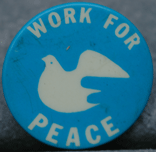 How sad
that 40 years after I acquired this button it is as necessary to work for peace
as it was when I got it. I don’t know what in our genetic make-up causes Homo
sapiens to instinctively react with violence when faced with obstacles, but we
do. I briefly considered reciting all the wars fought in the world during the
last fifty years. The sad truth is we would have had time for nothing else in
today’s message. I look at this button from time-to-time with guilt. Its message
is clear: peace takes work – continued, everlasting work. Some here in this
congregation have done their part. I am not one of them. My youthful enthusiasm
for changing the world has been worn down by the reality of man’s inhumanity to
man and my inability as one person to stop it. And yet there have been such one
persons in the past and will be in the future:
How sad
that 40 years after I acquired this button it is as necessary to work for peace
as it was when I got it. I don’t know what in our genetic make-up causes Homo
sapiens to instinctively react with violence when faced with obstacles, but we
do. I briefly considered reciting all the wars fought in the world during the
last fifty years. The sad truth is we would have had time for nothing else in
today’s message. I look at this button from time-to-time with guilt. Its message
is clear: peace takes work – continued, everlasting work. Some here in this
congregation have done their part. I am not one of them. My youthful enthusiasm
for changing the world has been worn down by the reality of man’s inhumanity to
man and my inability as one person to stop it. And yet there have been such one
persons in the past and will be in the future:
I hope I will keep forever
embedded in my mind the picture of the man refusing to allow the tanks in
Tiananmen Square to proceed without running him over. Perhaps in such
circumstances I could find equivalent courage, but I doubt it.
Today’s last button is the
only candidate pin I own. It is from a campaign before I was allowed to vote.
Under today’s rules I would have been eligible since I turned eighteen a week
prior to the 1968 elections, but back then we considered those eligible to be
drafted and sent to Viet Nam were not sufficiently mature to vote. You had to be
twenty-one for that and many died in that war before they had to right to vote
for the Congress who approved it.
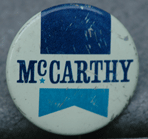 Eugene McCarthy
was one of the first politicians who risked his career by opposing the president
and leadership of his party over the Viet Nam war. Only after he lost the New
Hampshire primary to President Johnson by 42% to 48% did Bobby Kennedy jump into
the race. Back in the dark ages of which I write most delegates were not chosen
through primaries, but in the back rooms of the political establishment and
Hubert Humphrey became the democratic nominee. Humphrey lost a close contest to
Nixon with 42.7% of the popular vote to Nixon’s 43.4%. Wallace and his American
Independent Party siphoned off 13.5%, mostly from democrats, swinging the
election to Nixon.
Eugene McCarthy
was one of the first politicians who risked his career by opposing the president
and leadership of his party over the Viet Nam war. Only after he lost the New
Hampshire primary to President Johnson by 42% to 48% did Bobby Kennedy jump into
the race. Back in the dark ages of which I write most delegates were not chosen
through primaries, but in the back rooms of the political establishment and
Hubert Humphrey became the democratic nominee. Humphrey lost a close contest to
Nixon with 42.7% of the popular vote to Nixon’s 43.4%. Wallace and his American
Independent Party siphoned off 13.5%, mostly from democrats, swinging the
election to Nixon.
McCarthy’s approach to the
issues and campaign were directly opposite those used by George Wallace.
Choosing General Curtis “let’s nuke the commies in North Viet Nam” Le May as a
running mate, Wallace split from the Democratic party primarily over segregation
issues and formed the American Independent Party. This splitting off rarely has
the desired effect of changing the group from which one splits, and often
provides power to those in the other party with whom the splitter disagrees even
more strongly than they do with their original party. Such has been the case
three times in my memory: Wallace split the democratic vote and provided Nixon
the win. In 1992 Ross Perot gathered 18.9% of the popular vote. While he pulled
votes from both major parties, he drew more from the Republicans and Clinton
defeated the first president Bush in his reelection attempt. Most recently in
2000 Nader’s Green Party garnered 2.7% of the vote, more than sufficient to
swing the Gore/Bush race from a Gore victory to a squeaker for Bush.
Now in any of those elections
you may have been pleased or not about the eventual outcome, but there are
deeper lessons to be learned. Why on earth keep a McCarthy pin? Because I need
to remember that a single voice speaking the truth can make a difference. Of
course McCarthy did not get the nomination and once bitten by the presidential
bug he tried for the nomination multiple times with little success. However, by
speaking about an issue the leaders wanted to sweep under the rug he brought the
debate into the open air, where democracy’s battles should be fought. A periodic
glance at the McCarthy pin reminds me that silence in a democracy is not golden.
Secondly, the results of the
Wallace, Perot and Nader runs demonstrate that trying to change a system by
tearing it apart works less well than changing it from within. After the 1968
race, the McCarthy and Kennedy supporters took control of the Democratic Party
machinery and changed the nominating process to favor state primaries over
backroom candidate selection. The attitude of a pox on both your houses doesn’t
accomplish a darn thing. Only by digging into the power structure and changing
it does real change occur.
For example, businesses have
and will continue to adopt green policies when they find it improves their
bottom line. Not before. Oh sure, there will be a few companies led by people
who care for more for the planet and its inhabitants than the bottom line, but
in a capitalistic economy they are the exception. The United States is run by
the moneyed for the moneyed. The way to rapidly change their behavior is to find
ways they can monetarily do well by doing Good (with a capital G). If they can
do Good and stay monetarily even, most business leaders will do the right thing.
Our challenge as Unitarian
Universalists is to find the right monetary arguments to convince the powers to
do Good. For that we need to work the system from within. That is not my nature
nor, I suspect is it for many of you. My instinct is to throw verbal stones. And
so I turn to Eugene McCarthy and thank him for showing me how it is done. I’ll
know I have fully incorporated this knowledge into my life when I look at his
button and realize I no longer need it.
I look forward to that day.
Home
 In
the 1990s while I lived in Cincinnati there was a push to change the city
charter to prohibit legislation to protect against discrimination based on
sexual orientation. The proponents of this change coded their message by using
the advertising slogan “Equal Rights, not Special Rights.” Using specious,
inflammatory arguments and massive advertising funded by outside interests they
won and for 13 years Cincinnati had to exclude any reference to sexual
orientation from its anti-discrimination laws.
In
the 1990s while I lived in Cincinnati there was a push to change the city
charter to prohibit legislation to protect against discrimination based on
sexual orientation. The proponents of this change coded their message by using
the advertising slogan “Equal Rights, not Special Rights.” Using specious,
inflammatory arguments and massive advertising funded by outside interests they
won and for 13 years Cincinnati had to exclude any reference to sexual
orientation from its anti-discrimination laws.
 I
threw away the sample and promptly pinned the button on my jacket and wore it
there for several years. At its deepest level this concept resonates with my
sense of what is right in human relations. Think about how your relationship
with every other human will change if your first thought is to try a little
kindness.
I
threw away the sample and promptly pinned the button on my jacket and wore it
there for several years. At its deepest level this concept resonates with my
sense of what is right in human relations. Think about how your relationship
with every other human will change if your first thought is to try a little
kindness. How sad
that 40 years after I acquired this button it is as necessary to work for peace
as it was when I got it. I don’t know what in our genetic make-up causes Homo
sapiens to instinctively react with violence when faced with obstacles, but we
do. I briefly considered reciting all the wars fought in the world during the
last fifty years. The sad truth is we would have had time for nothing else in
today’s message. I look at this button from time-to-time with guilt. Its message
is clear: peace takes work – continued, everlasting work. Some here in this
congregation have done their part. I am not one of them. My youthful enthusiasm
for changing the world has been worn down by the reality of man’s inhumanity to
man and my inability as one person to stop it. And yet there have been such one
persons in the past and will be in the future:
How sad
that 40 years after I acquired this button it is as necessary to work for peace
as it was when I got it. I don’t know what in our genetic make-up causes Homo
sapiens to instinctively react with violence when faced with obstacles, but we
do. I briefly considered reciting all the wars fought in the world during the
last fifty years. The sad truth is we would have had time for nothing else in
today’s message. I look at this button from time-to-time with guilt. Its message
is clear: peace takes work – continued, everlasting work. Some here in this
congregation have done their part. I am not one of them. My youthful enthusiasm
for changing the world has been worn down by the reality of man’s inhumanity to
man and my inability as one person to stop it. And yet there have been such one
persons in the past and will be in the future: Eugene McCarthy
was one of the first politicians who risked his career by opposing the president
and leadership of his party over the Viet Nam war. Only after he lost the New
Hampshire primary to President Johnson by 42% to 48% did Bobby Kennedy jump into
the race. Back in the dark ages of which I write most delegates were not chosen
through primaries, but in the back rooms of the political establishment and
Hubert Humphrey became the democratic nominee. Humphrey lost a close contest to
Nixon with 42.7% of the popular vote to Nixon’s 43.4%. Wallace and his American
Independent Party siphoned off 13.5%, mostly from democrats, swinging the
election to Nixon.
Eugene McCarthy
was one of the first politicians who risked his career by opposing the president
and leadership of his party over the Viet Nam war. Only after he lost the New
Hampshire primary to President Johnson by 42% to 48% did Bobby Kennedy jump into
the race. Back in the dark ages of which I write most delegates were not chosen
through primaries, but in the back rooms of the political establishment and
Hubert Humphrey became the democratic nominee. Humphrey lost a close contest to
Nixon with 42.7% of the popular vote to Nixon’s 43.4%. Wallace and his American
Independent Party siphoned off 13.5%, mostly from democrats, swinging the
election to Nixon.